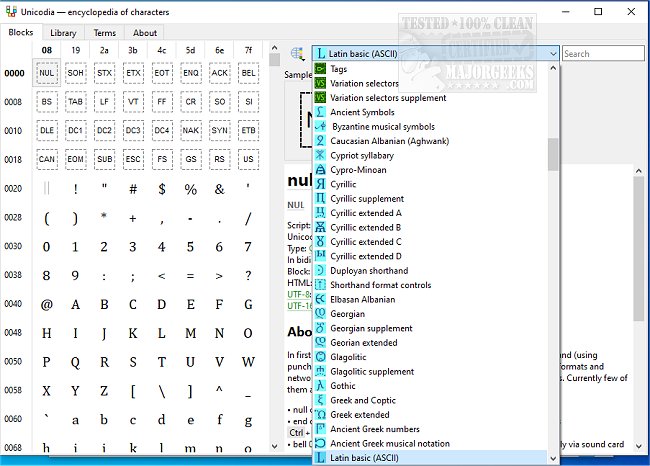Unicodia 3.0.0 has been officially released, enhancing the capabilities of this Open Source encyclopedia of Unicode characters. Designed to serve as an alternative character map for Windows users, Unicodia allows for seamless browsing of ASCII symbols, which can be easily copied to the clipboard for various applications. Its portability is a significant advantage, as it can be loaded onto a USB drive, enabling users to access it from any location.
The interface is user-friendly and displays a comprehensive collection of Unicode characters, including all characters from Unicode 15 for Windows 10/11 users. For those on Windows 7, it offers a selection from the Base Multilingual Plane, as well as important scripts like Phoenician, Aramaic, Brahmi, and Old Gothic. Additionally, the application indicates whether a character is supported by the user's system and which font it is associated with. Users can copy character codes in multiple formats, including HTML, UTF-8, and UTF-16.
To install Unicodia, users need to unpack the archive using 7-zip or a similar tool. The software provides a simple search function, making it easier to find specific characters.
In conclusion, Unicodia 3.0.0 is a valuable tool for anyone who frequently works with Unicode characters, offering a rich repository of symbols that can enhance communication, design, and programming tasks. Its portability and compatibility across various Windows versions further solidify its utility, making it an essential resource for users looking to expand their character options. Future updates may focus on expanding the character set, improving user experience, and incorporating additional features to keep pace with evolving Unicode standards
The interface is user-friendly and displays a comprehensive collection of Unicode characters, including all characters from Unicode 15 for Windows 10/11 users. For those on Windows 7, it offers a selection from the Base Multilingual Plane, as well as important scripts like Phoenician, Aramaic, Brahmi, and Old Gothic. Additionally, the application indicates whether a character is supported by the user's system and which font it is associated with. Users can copy character codes in multiple formats, including HTML, UTF-8, and UTF-16.
To install Unicodia, users need to unpack the archive using 7-zip or a similar tool. The software provides a simple search function, making it easier to find specific characters.
In conclusion, Unicodia 3.0.0 is a valuable tool for anyone who frequently works with Unicode characters, offering a rich repository of symbols that can enhance communication, design, and programming tasks. Its portability and compatibility across various Windows versions further solidify its utility, making it an essential resource for users looking to expand their character options. Future updates may focus on expanding the character set, improving user experience, and incorporating additional features to keep pace with evolving Unicode standards
Unicodia 3.0.0 released
Unicodia is an Open Source encyclopedia of Unicode characters.


